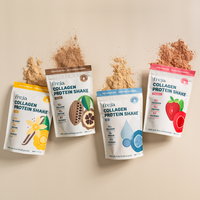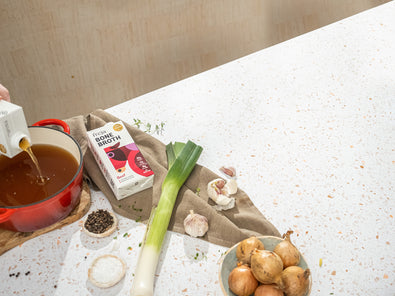Did you know, the average human body contains around 38 trillion bacteria cells and just 30 trillion human cells [1]? That means we’re technically more bacteria than human.
With most of these bacteria cells found in the gut, it’s safe to say our gut is a very important factor in our wider physical and mental health. However, many people may not know that summer heat can have some significant impacts on our gut microbiome, so it’s important to know the effects and what you can do to manage them.
In this blog, we’ll cover what the gut microbiome is, how summer heat can affect your gut health, and what you can do to protect it during the hotter months.
Understanding the Gut Microbiome
To begin, we’ll look at the gut microbiome to discover exactly what it is and why it’s so important for our health.
What is the gut microbiome?
The gut microbiome is the collection of bacteria, viruses, fungi and other microorganisms which live inside your gastrointestinal system [2], commonly referred to as the gut.
Each person’s gut microbiome is unique to them, as diet and environmental factors regularly introduce new microbes into the body [3].
Why is the gut microbiome important?
Your gut microbiome is one of the most significant factors when it comes to your overall health. The relationship between our bodies and most of the microbes within them is symbiotic, meaning as long as we provide them with what they need to survive (e.g. a healthy gut environment), they will carry out important functions for us [4].
This also means when we neglect our gut health, some of these important microbes may not function properly which can lead to issues with our wider health.
Poor gut health has been associated with a wide range of health concerns [5], including:
- The immune system
- Mental health
- Autoimmune diseases
- Endocrine disorders - including type 2 diabetes
- Gastrointestinal problems - such as IBS and digestive issues
- Cardiovascular disease
- Sleep and fatigue
- Cancer
The gut is also commonly referred to as ‘the second brain’ [6], which demonstrates just how vital it is to the proper function of the body.
The gut microbiome balance
The balance of your gut microbiome is an important aspect of your gut health. A balanced gut microbiome has a healthy diversity of microorganisms, meaning no specific bacteria, virus or fungus dominates [7].
An imbalanced gut microbiome is known as gut dysbiosis. Not only can this prevent some microorganisms from functioning correctly, it can actually interfere with other bodily systems and have more direct negative impacts on your health.
Gut dysbiosis can cause [8]:
- Bacterial infections
- Inflammatory bowel diseases (including Chron’s disease and ulcerative colitis)
- Digestive issues (bloating, gas, constipation and diarrhoea)
- Small intestinal bacterial overgrowth (SIBO)
- Wider effects throughout the body due to your gut’s connection with the immune, nervous and endocrine systems
Impact of Hot Weather on the Gut Microbiome
So, how does hot weather impact your gut microbiome?
Let’s explore that now.
Changes in your gut’s microbial balance
As temperatures rise, the impact of our eating and drinking habits tends to have a bigger effect on our gut.
In the summer, there is a much higher risk of dehydration due to the increased heat, and we often eat or drink differently than we would during the colder months. Whether this is eating less due to a reduced appetite when it’s hot, or sweating more and drinking more alcohol for example, this can lead to a disturbance in the balance of your gut microbiome [9].
It’s important to give your gut what it needs to thrive all year round, and be mindful of how these needs can change during hotter times.
Increased harmful bacteria
It has been shown that high temperatures greatly increase the rate of bacterial growth [10], which can pose another threat during the summer months.
Whilst the wintertime is more commonly associated with illnesses, the hotter times of the year can cause just as many issues, especially when it comes to food. As perishable foods reach the temperature ‘danger zone’ faster in the heat, it can be easy to forget and eat something that might have been left out too long.
No matter how harmful bacteria comes into your body, when it’s hotter outside these bacteria can thrive and cause a host of issues for your health.
Reduced gut barrier function
Studies have shown that heat stress can stimulate an inflammatory response in the body which can weaken gut integrity and compromise gut barrier function, leading to a condition called leaky gut [11+12].
As the name suggests, leaky gut refers to cracks or holes within the lining of your gut, meaning partially digested food and toxins can make their way into your tissue and bloodstream. This can lead to a wide range of health issues which go beyond digestion.
Tips to Protect Your Gut Microbiome in Hot Weather
From encouraging bacterial growth to causing an imbalance in your gut microbiome, there are several ways the hot weather can impact your gut health.
Thankfully, there are ways to mitigate these risks and keep your gut microbiome in good shape throughout the summer.
Let’s look at some of those now.
Stay hydrated
One of the easiest and most effective ways to support your gut health during the summer is to stay hydrated.
Proper hydration can positively impact the gut microbiome by supporting a range of processes such as intestinal secretions, gut motility, and waste removal [13].
Ensure you’re drinking enough water and taking in electrolytes, which you can get from foods such as bone broth, throughout the day. Electrolytes support fluid retention, which can help you to stay hydrated for longer - especially when you’re sweating.
Eat gut-friendly foods
Ensuring you are feeding your gut microbiome with what it needs to function properly and remain in balance is crucial during summer.
There are a range of foods which are beneficial for your gut microbiome. Read on for some suggestions.
High fibre foods
Fibre has been shown to positively impact the gut microbiome [14] and promote better digestion.
Some high fibre foods you can enjoy are:
- Vegetables - such as carrots and broccoli
- Legumes - such as beans and lentils
- Fruits - such as avocados and berries
- Nuts - such as hazelnuts and peanuts
- Whole grains - such as bulgur and quinoa
Probiotics
Probiotics are live bacteria and yeasts which are beneficial to the body. By adding these into your diet, you are essentially increasing the concentration of your ‘good’ gut bacteria, which can help to prevent an imbalance in your gut microbiome.
Fermented foods are packed with probiotics, making them a good addition to your diet. These include:
- Kefir
- Kimchi
- Sauerkraut
- Yoghurt
- Pickles/gherkins
- Sour cream
Collagen-rich foods
Eating collagen-rich foods is a great way to naturally strengthen your gut lining and digestive tract, which can help to prevent and treat leaky gut syndrome year-round.
One of the best collagen-rich foods to incorporate into your diet to support a healthier gut microbiome is bone broth. Freja bone broth is packed with natural collagen, Types I, II and III, as well as a wide range of amino acids, vitamins and minerals which can also support your wider health.
Freja bone broth is available in three different forms: Classic Bone Broth, an award-winning, flavourful liquid broth; Bone Broth Nutrition, a neutrally-flavoured powder for adding to foods and drinks; and the Bone Broth Shake, a subtly sweet, delicious instant milkshake. This makes it easy to get the natural, gut-healing collagen you need, no matter your taste preferences.
Manage stress
Studies have shown that stress can disrupt the harmony of our gut microbiome, leading to imbalances which can cause a range of issues [15].
As the heat is already placing your gut microbiome under additional stress, managing your day-to-day stress levels can help to keep everything in balance during the summer.
To help manage stress, ensure you’re exercising regularly and sleeping well, as well as making sure you allow yourself enough personal time to decompress and unwind.
Limit alcohol
Whilst it can be tempting to enjoy a drink or two in the sun, it’s important to be mindful of the effects alcohol can have on the gut microbiome.
Excessive alcohol consumption can: inhibit the production of digestive enzymes, making it harder to digest and absorb the nutrients from food [16]; cause inflammation in the gut and increase the likelihood of leaky gut syndrome [17]; and lead to gut dysbiosis [18+19].
If you’re going to be drinking, do so in moderation and ensure you’re staying hydrated with other fluids.
Conclusion
Maintaining a healthy gut microbiome can seem like a challenging task, especially during the summer. However, knowing the risks the heat can pose and how best to deal with them can help you keep your gut healthy and in balance all year round.
Ensure you’re eating a balanced diet consisting of fibre, probiotics and collagen, manage your stress levels and limit your alcohol consumption to keep your gut in top shape when the sun is shining.
If you’re looking for an easy, natural way to support your gut health during the summer and beyond, try Freja bone broth. Easy to digest and packed with healing collagen, a daily cup of bone broth can help repair and strengthen your gut, and ward off potential gut issues.
Discover the Freja Bone Broth collection and do your gut a favour.
References

























